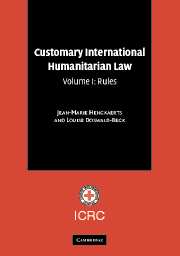Book contents
- Frontmatter
- Contents
- Foreword by ICRC President Jakob Kellenberger
- Foreword by Judge Abdul G. Koroma
- Foreword by Yves Sandoz
- Acknowledgements
- Introduction
- List of abbreviations
- Part I The Principle of Distinction
- Part II Specifically Protected Persons and Objects
- Part III Specific Methods of Warfare
- Part IV Weapons
- Part V Treatment of Civilians and Persons Hors De Combat
- Chapter 32 Fundamental Guarantees (Rules 87–105)
- Chapter 33 Combatants and Prisoner-of-War Status (Rules 106–108)
- Chapter 34 The Wounded, Sick and Shipwrecked (Rules 109–111)
- Chapter 35 The Dead (Rules 112–116)
- Chapter 36 Missing Persons (Rule 117)
- Chapter 37 Persons Deprived of Their Liberty (Rules 118–128)
- Chapter 38 Displacement and Displaced Persons (Rules 129–133)
- Chapter 39 Other Persons Afforded Specific Protection (Rules 134–138)
- Part VI Implementation
Chapter 34 - The Wounded, Sick and Shipwrecked (Rules 109–111)
Published online by Cambridge University Press: 05 June 2012
- Frontmatter
- Contents
- Foreword by ICRC President Jakob Kellenberger
- Foreword by Judge Abdul G. Koroma
- Foreword by Yves Sandoz
- Acknowledgements
- Introduction
- List of abbreviations
- Part I The Principle of Distinction
- Part II Specifically Protected Persons and Objects
- Part III Specific Methods of Warfare
- Part IV Weapons
- Part V Treatment of Civilians and Persons Hors De Combat
- Chapter 32 Fundamental Guarantees (Rules 87–105)
- Chapter 33 Combatants and Prisoner-of-War Status (Rules 106–108)
- Chapter 34 The Wounded, Sick and Shipwrecked (Rules 109–111)
- Chapter 35 The Dead (Rules 112–116)
- Chapter 36 Missing Persons (Rule 117)
- Chapter 37 Persons Deprived of Their Liberty (Rules 118–128)
- Chapter 38 Displacement and Displaced Persons (Rules 129–133)
- Chapter 39 Other Persons Afforded Specific Protection (Rules 134–138)
- Part VI Implementation
Summary
Rule 109. Whenever circumstances permit, and particularly after an engagement, each party to the conflict must, without delay, take all possible measures to search for, collect and evacuate the wounded, sick and shipwrecked without adverse distinction.
Practice
Volume II, Chapter 34, Section A.
Summary
State practice establishes this rule as a norm of customary international law applicable in both international and non-international armed conflicts.
International armed conflicts
The duty to collect wounded and sick combatants without distinction in international armed conflicts was first codified in the 1864 Geneva Convention. This subject is dealt with in more detail in the 1949 Geneva Conventions. This duty is now codified in Article 10 of Additional Protocol I, albeit in more general terms of “protecting” the wounded, sick and shipwrecked, which means “coming to their defence, lending help and support”.
The numerous military manuals which contain this rule are phrased in general terms covering all wounded, sick and shipwrecked, whether military or civilian. Sweden's IHL Manual, in particular, identifies Article 10 of Additional Protocol I as a codification of customary international law. The legislation of many States provides for the punishment of persons who abandon the wounded, sick and shipwrecked.
Non-international armed conflicts
In the context of non-international armed conflicts, this rule is based on common Article 3 of the Geneva Conventions, which provides that “the wounded and sick shall be collected”.
- Type
- Chapter
- Information
- Customary International Humanitarian Law , pp. 396 - 405Publisher: Cambridge University PressPrint publication year: 2005



